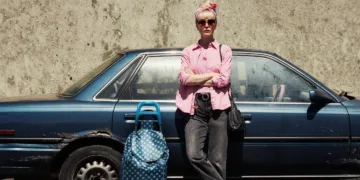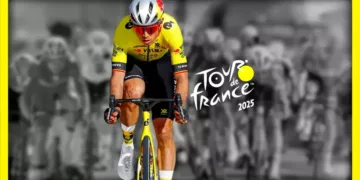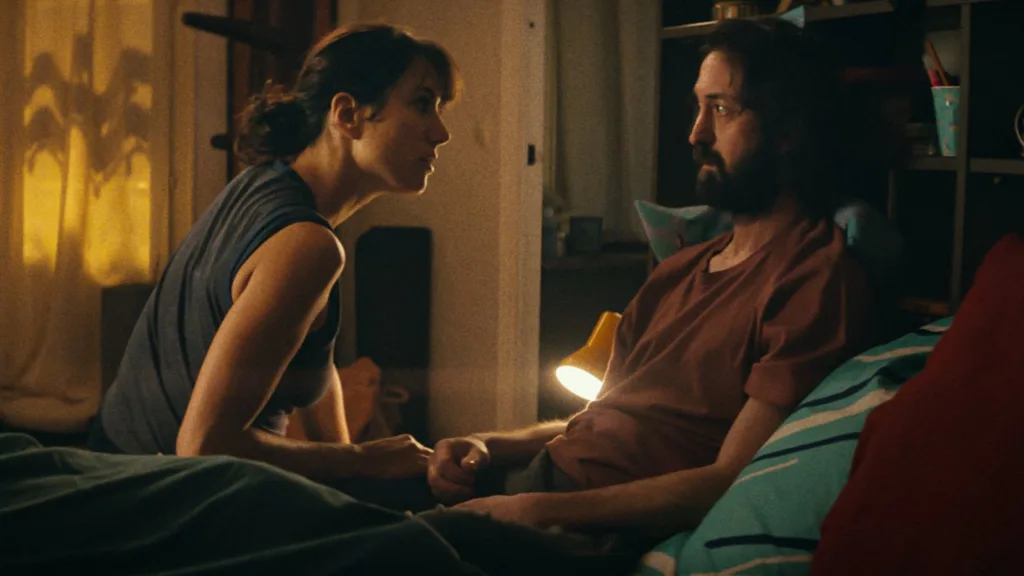French cinema often operates with a casual frankness about the body that can feel startling to outside audiences. Zenithal takes this tradition and pushes it into the realm of high farce. The film introduces us to Francis, a dry cleaner living a life of quiet desperation. His glory days, which bizarrely involved being the on-screen nemesis to a martial arts master with a supernaturally large penis, are long past.
His relationship with his partner, Sonia, a self-defense instructor, has stalled. To fix things, she has imposed a strict six-month period of sexual abstinence, a project meant to force them to connect on a higher plane. Francis, feeling useless and adrift, is ill-equipped for this challenge.
The film immediately establishes a world where the anxieties of modern masculinity are not just discussed but given literal, absurd physical form. It’s a strange and provocative setup, a uniquely Gallic satire that uses a wild premise to ask questions about male identity in a world of shifting expectations.
Weaponized Absurdity
The film’s comedic engine is fueled by an unceasing, almost confrontational, focus on the male member. The plot accelerates with the appearance of a new antagonist, a maniacal surgeon who leads a cult of resentful men aiming to restore patriarchal order. Francis is drawn into this group’s orbit following a murder where the victim’s penis is found severed and modified with an electronic brain.
This event launches the story into what can only be described as “dick-fu,” a series of gags and set pieces where the phallus is a source of power, comedy, and extreme anxiety. The humor draws from a specific, juvenile wellspring, but its execution has a strange dryness. The film’s commitment is total, extending to a villainous plot to destroy the moon.
The approach feels like a distant cousin to the exaggerated physics of Hong Kong action films, where the impossible becomes a form of physical storytelling. For some, the relentless gags will be a masterclass in absurdism; for others, the single-minded joke may wear thin, becoming a schoolboy prank that distracts from its own satirical target.
Gender Politics on a Farcical Stage
At the center of the film’s ideological tug-of-war are its two leads. Sonia is presented as the story’s pragmatic hero, a woman who takes action to save her partner and their relationship. Vanessa Guide gives a standout performance, injecting a knowing intelligence and force into a character who could have easily been a simple archetype of female empowerment.
She provides a necessary anchor against the film’s chaotic energy. In contrast, Franc Bruneau’s Francis is a study in masculine confusion. He is a hapless figure, easily swayed by a toxic ideology that promises to restore his sense of purpose. The dynamic between them is the film’s most interesting part, yet the script seems uncertain of its focus. For a film that positions Sonia as its hero, it spends a great deal of time exploring Francis’s angst.
This creates a strange tension, as if we are watching a man’s anxious fantasy about a woman saving him from himself. The supporting characters, from the friend Marcus to the guru, serve their purpose in this manic world but rarely feel like more than props in the central couple’s psychodrama.
Silly Staging, Serious Style
For all its crude humor and thematic untidiness, Zenithal is a remarkably well-crafted object. Director Jean-Baptiste Saurel demonstrates a firm command of tone, corralling the narrative’s wild impulses into a coherent, if manic, whole. The film looks far more expensive than its budget would suggest, a credit to cinematographer Yann Maritaud.
The screen is filled with rich colors and deliberate lighting, creating a polished visual texture that elevates the silliness. There is a distinct theatricality to the production; its “stage-like” quality and “hand-crafted” feel make the artifice part of the point. The direction uses clever editing and visual gags to keep the pace brisk and the energy high.
This stylistic confidence is crucial. The visual flair and energetic control do not fix the script’s sometimes-shallow explorations, but they do make the viewing experience a potent feast for the eyes, proving that even the most outrageous ideas can be presented with artistry.
Zenithal is a playful French romantic comedy‑thriller directed by Jean‑Baptiste Saurel. The film premiered in France on August 21, 2024, played festivals across Europe—including Venice, Brussels, and Finland—and opened in U.S. limited release on May 30, 2025. It runs 80 minutes and is currently available via on‑demand platforms through distributor Dark Star Pictures.
Full Credits
Director: Jean‑Baptiste Saurel
Writers: Jean‑Baptiste Saurel, Élodie Wallace, Amaury Ovise
Producers: Amaury Ovise
Cast: Vanessa Guide, Franc Bruneau, Cyril Gueï, Xavier Lacaille, Bruno Gouery, Anaïde Rozam, Rebecca Finet
Director of Photography (Cinematographer): Yann Maritaud
Composer: Manuel Peskine
The Review
Zenithal
Zenithal is a brazenly strange and stylistically beautiful film that cannot escape its own juvenile impulses. While its visual flair and a commanding lead performance from Vanessa Guide are impressive, the relentless one-note humor and muddled social commentary keep it from reaching its satirical potential. It is an audacious, unforgettable, yet deeply flawed cinematic experiment.
PROS
- Striking cinematography and visual design.
- Excellent lead performance by Vanessa Guide.
- A bold and completely original premise.
CONS
- Repetitive and juvenile comedic focus.
- Unfocused script with messy themes.
- Underdeveloped supporting characters.

















































